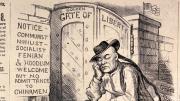The fatwa that Iran issued in response to Salman Rushdie’s 1988 novel The Satanic Verses affected his agent, Andrew Wylie, directly. “Tehran was sending out teams of people to kill--Rushdie, primarily, but also those associated with him,” Wylie relates. “There was lots of information coming in at warp speed. Visiting Rushdie was an excitement in itself, involving unmarked cars and street corners and high-speed drives going the wrong way down streets. It was a period of intensely heightened experience.”
It was also “an act of international terror, a nation condemning an individual from another country to death,” he continues. “How do you react to that? Do you cave? Do you withdraw the book from publication? Do you hide and hope it goes away? Or do you stand up to it? It’s like a hostage crisis, and Rushdie was effectively held hostage. He and I both felt it was critically important for the publishing world--and for freedom of speech--to arrange for the orderly publication of the paperback edition one year after the hardcover publication.”
Normally, that paperback would have appeared in the fall of 1989. Instead, the hardcover publisher, Penguin, declined to publish the paperback edition; furthermore, “each and every publisher in New York refused to publish the paperback or even to participate in the publication of the paperback,” Wylie says. “There was a lot of fear, some of it for good reason. The Norwegian publisher of the hardcover was shot three times in the back by a hit squad. But he ordered a reprint from his hospital bed. It was one of American publishing’s darkest hours, in my view. The cover for the reaction was, ‘I can’t put my employees at risk.’ The fundamental issue, though, was: Is there freedom of speech, or is there not? It was about having the courage of your convictions.” The paperback finally appeared in 1992, from a group of publishers styled “The Consortium.” Rushdie is now writing a book on the fatwa episode.










